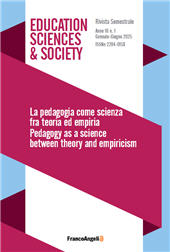Embodied learning in the Society 5.0 : physical literacy as an epistemological framework for contemporary physical education
328-342 p.
This article aims to explore the epistemological foundations of physical education within the context of Society 5.0, examining the tension between empirical-experimental approaches and holistic perspectives in understanding embodied learning processes. Drawing on Buyse's pioneering integration of scientific methods into pedagogy, this paper proposes physical literacy as a transdisciplinary framework that bridges theoretical foundations and empirical methodologies in physical education research. Through critical analysis of contemporary research paradigms, the article identifies the convergence of bioecological, phenomenological, and critical realist perspectives that characterize the evolving epistemology of physical education. The analysis reveals how physical literacy offers a comprehensive framework for understanding the multidimensional nature of embodied learning, encompassing cognitive, affective, physical, and environmental domains while addressing the ethical implications of educational research
This integrated approach transcends the traditional dichotomy between qualitative and quantitative methodologies, enabling a more nuanced understanding of physical education that aligns with the complex demands of Society 5.0 while honoring the axiological dimensions of pedagogical science. [Publisher's text]
Fa parte di
Education Sciences & Society : 1,2025-
Articoli dello stesso fascicolo (disponibili singolarmente)
-
Informazioni
Codice DOI: 10.3280/ess1-2025oa19749
ISSN: 2038-9442
PAROLE CHIAVE
- physical literacy, embodied learning, epistemology, physical education, experimental pedagogy, Society 50.


